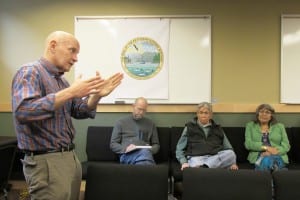After much delay, two special sessions and the threat of a government shutdown, Alaska’s House and Senate approved a fully funded state budget Thursday, to the relief of Ketchikan Gateway Borough officials.
The big issue of local concern was school funding, which now is secured at a higher level than a previous version of the budget.
Here’s Borough Manager Dan Bockhorst: “The action taken by the second special session of the 29th Alaska Legislature means an additional $16.5 million for state education funding formula. That’ll break down for the Ketchikan Gateway Borough School District to an additional $320,000.”
That brings the school district budget up to the “red line,” which is the minimum that school officials say is needed to maintain operations.
“This is real good for the district,” said Schools Superintendent Robert Boyle.
He said with red-line funding secured, most of the supplies budgets are reinstated.
What remains below the red line, and potentially unfunded, are a few new teaching positions – including for the Native Art and Tribal Scholars programs – some activities funding, half-day preschools, the Schoenbar Middle School 1-1 computer program, and a portion of the district’s operations and maintenance supplies.
Boyle said those supplies are a concern, but the district is holding the line on spending now, in hopes of mitigating that.
“Since we quit spending in anticipation of potential budget cuts, significant, that means that the amount of revenue, unspent revenue, carried into next school year is increasing,” he said.
Boyle estimated that the carryover could end up at more than a million dollars.
House District 36 Rep. Dan Ortiz of Ketchikan called in from the special session in Anchorage soon after the budget was officially approved. He said he’s pleased with the results, which restored funding for education, senior services and the Alaska Marine Highway System.
With this year’s budget done, Ortiz said lawmakers can start thinking about the next one.
“Obviously, the big picture is what we still need to get to, which is how to get to that sustainable budget level,” he said. “The serious compromises and the serious consideration that needs to be given to solve that bigger issue, which is what I’m most happy about is that we can move on to the bigger issue that the state is facing.”
The bigger issue is a huge budget deficit, the result of low oil tax revenue. This year’s deficit topped $3 billion, and next year’s projection doesn’t appear any better.
Ortiz said there has been talk of additional special sessions this year, so lawmakers can focus on how to close that budget gap.







